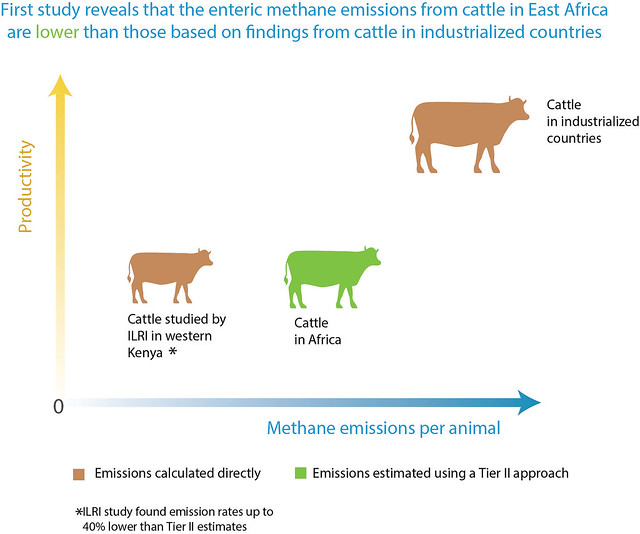Science helps tailor livestock-related climate change mitigation strategies in Africa
- From
-
Published on
17.07.18
- Impact Area
-
Funders
EU Commission, IFAD
 Livestock contribute greatly to livelihoods and food security in Africa, yet they are both vulnerable to climate change and a major contributor to greenhouse gas (GHG) emissions, a known driver of climate change. Climate change is expected to alter the quantity and quality of available animal feed and impact livestock directly through increased heat stress, changes in water availability and a greater range of livestock diseases. And higher levels of poverty in Africa exacerbate the effects of GHG-induced climate change on vulnerable populations.
Livestock contribute greatly to livelihoods and food security in Africa, yet they are both vulnerable to climate change and a major contributor to greenhouse gas (GHG) emissions, a known driver of climate change. Climate change is expected to alter the quantity and quality of available animal feed and impact livestock directly through increased heat stress, changes in water availability and a greater range of livestock diseases. And higher levels of poverty in Africa exacerbate the effects of GHG-induced climate change on vulnerable populations.
Existing estimates suggest that the livestock sector in Africa contributes to more than 70% of the continent’s agricultural GHG emissions, mainly due to methane and nitrous oxide emissions, two particularly potent GHGs, predominantly from cattle and their manure. The implementation of effective mitigation strategies relies on accurate GHG emission data. But what if the underlying assumptions upon which these GHG emission estimates are based are inaccurate?
![]()
Related news
-

Mapping for Resilience: How Spatial Data is Transforming Karamoja Cluster
Ibukun Taiwo02.07.25-
Climate adaptation & mitigation
Pastoral communities in the Karamoja Cluster (a region spanning Kenya, Uganda, South Sudan, and Ethi…
Read more -
-

Building Resilience and Regeneration: The Central Highlands Ecoregion Foodscape (CHEF)
Sehlule Muzata02.07.25-
Climate adaptation & mitigation
At the CGIAR Sustainable Farming Program (SFP), we believe that collaboration is essential for trans…
Read more -
-

Planting with Precision: How Weather and Climate Information is Changing Bean Farming in Rwanda
The Alliance of Bioversity International and the International Center for Tropical Agriculture (CIAT)01.07.25-
Climate adaptation & mitigation
Imagine weather information as a GPS for farmers. Without it, the journey becomes uncertain, filled…
Read more -

